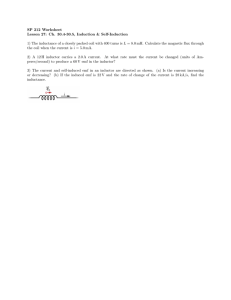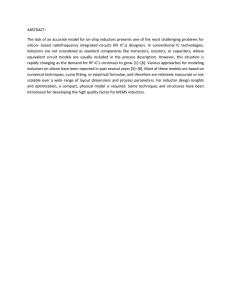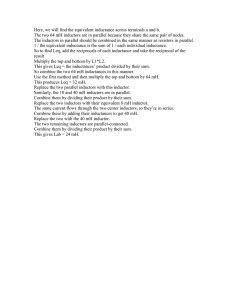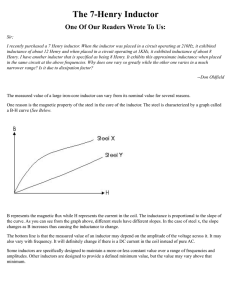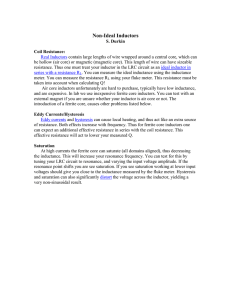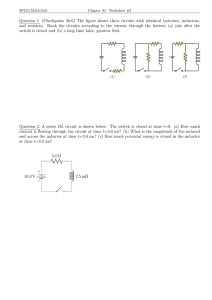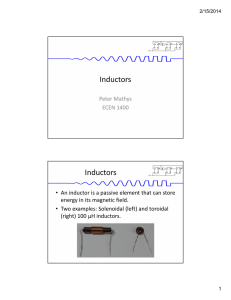Document
advertisement
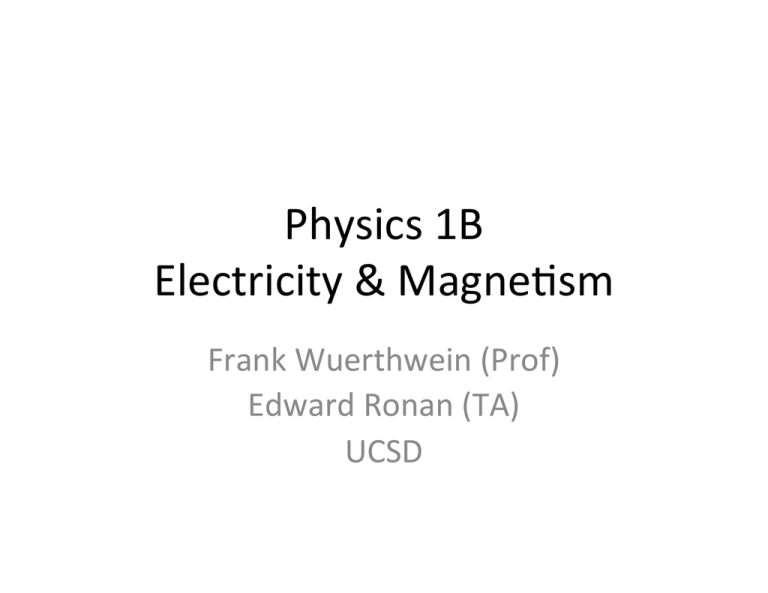
Physics 1B Electricity & Magne4sm Frank Wuerthwein (Prof) Edward Ronan (TA) UCSD Outline of today • Inductors Quiz 4 Content • Chapter 23 • This includes everything we have done in class including all of today’s slides. • It also implies that you need to be able to analyze circuits with R and L as we do today. • So strictly speaking, you s4ll need to know some of the things you learned in earlier chapters in order to analyze these circuits. Inductors • In a circuit, capacitors store electric fields for later use. • Also, for a circuit we have inductors which produce useable magne4c fields. • The symbol for an inductor is: " If a solenoid of N windings has a current, I, moving through it that creates a magnetic flux, ΦB, through its center, then we define it to have an inductance, L, of: N"B L= I Inductors • Inductance is basically the total magne4c flux per unit of current required to produce it. • Like capacitance is the charge per unit voltage. • The inductance of an inductor depends only on its geometry (just like capacitors). • The unit of inductance is the Henry (H): T"m 1H =1 A " 2 So, for a solenoid with length, l, N windings, loop area, A, and current I: N ( BA) L= ! I Inductors But, from before, we kmow that for a solenoid: B = µo N ! I ( ) This means that inductance for a solenoid becomes: " µo NI % 'A N$ 2 ! µo N A # & = ! L= I ! So the inductance of a solenoid is independent of the applied current. ! To increase inductance for a coil: increase the number of windings, N, OR increase the area per loop, A, OR decrease the length of the solenoid, l. ! Self Inductance • If the current in a solenoid is changing in 4me, then its magne4c flux will change, leading to an induced emf. • This is called self-­‐induc4on. N"B L= I " " LI = N"B But recall from Faraday s Law: $% B $ ( LI) " = #N " =# ! $t $t Since L is only dependent on geometry: $I "L = #L ! $t Inductance • Recall that resistance was a measure of how much a certain element opposed current flow. • Inductance can be interpreted as a measure of opposi4on to the rate of change in the current. " " As a circuit is completed (switch closed), the current begins to increase, but the inductor produces an emf that opposes the increasing current. There is a voltage drop across the inductor. IL Inductance • Thus, the current doesn t change from 0 to its maximum value instantaneously. • If you are increasing the current, I, in an inductor, there will be increasing magne4c flux inside the inductor. " " The inductor will then create an emf to oppose this change in current. When the current reaches its maximum value, the rate of change is zero, and, thus, emf by inductor is also zero. Inductance • When, a circuit is connected, it takes a certain amount of 4me for the current to reach its final value. " The time constant, τ, for an RL circuit is the time required for the current in the circuit to reach 63.2% of its final value. L "L = R Inductance The current at any 4me can be found by: " " If you are decreasing the current, I, in an inductor, there will be decreasing magnetic flux inside the inductor. ! The inductor will then create an emf to oppose this change in current. I= "% '1# e R& #t $L ( * ) IL Inductors • Example • A solenoid having an inductance of 6.30μH is connected in series with a 1.20kΩ resistor. If a 14.0V babery is connected across the pair, how long will it take for the current through the resistor to reach 80.0% of its final value? " " " Answer This is a basic RL circuit connected to an emf source. We should turn to the circuit equation from last slide. " Inductors Answer I= " '1# e R& #t $L ( * ) where ɛ/R is the maximum value that the current will attain. Since we want 80% of this value we can replace it with: ! " "% (0.80)Imax "t ' $ #L = Imax &1" e ) % ( Now, we just have to solve for time: "t ' $ #L ! ) = &1" e ) (0.80 % ( e "t #L = 1" 0.80 = 0.20 " Answer Inductors $ "t # L ' "t ln&e ) = # = ln(0.20) % ( L ! # 6.30 )10"6 H & # L& t = "% ( ln(0.20) = "% (("1.609) 3 $ R' $ 1.20 )10 * ' #9 t = 8.45 "10 s ! " Note that the current gets to nearly its maximum value rather quickly. " ! that even though the potential difference of the battery Also note was given, it didn t affect the overall answer. • Example Inductors • The figure below shows a circuit that contains three iden4cal resistors with resistance R = 9.0Ω, two iden4cal inductors with inductance L = 2.0mH, and an ideal babery with emf ɛ = 18V. What is the current through the babery long aier the switch has been closed? " " " Answer First, you must define a direction for the current I through the battery. Up makes sense. ! " Inductors Answer There will be voltage drops at the inductors and the resistors given by: " "VR = IR " " " " "I "VL = #L "t In circuits with a battery and RL circuits, the current will eventually reach some final value. This means that it will not be changing in time and, thus, there ! across the inductors. will be no voltage drop This means that the inductors will act as regular wires when the current reaches a steady value. Yet there will still be voltage drop across the resistors. Inductors Answer This means that the circuit can be reduced to the following a long time after the switch is closed: " " " We basically have three resistors in parallel which we can easily solve by equivalent resistance. 1 1 1 1 3 = + + = Req R R R R R 9" Req = = = 3" 3 3 " The current will be: "VR 18V I= = = 6.0A Req 3# Energy in an Inductor • We say that a capacitor can store energy in its electric field which is given by: 1 2 E Cap = C ("V ) " We also say that an inductor can store energy in its magnetic field which is given by: 1 2 E L = LI ! " 2 2 If you attempt to change the current through the inductor, the energy stored in the inductor will perform work to oppose this change. ! Concept Q ues4on The figures to the right show 1 three circuits with iden4cal baberies, inductors, and resistors. Rank the circuits according to the current through the babery a long 4me aier the switch is closed (greatest first). A) 1, 2, 3. B) 1, 3, 2. C) 2, 1, 3. D) 2, 3, 1. E) 3, 2, 1. 3 2 For Next Time (FNT) " Finish reading Chapter 23 " Finish working on the homework for Chapter 23
